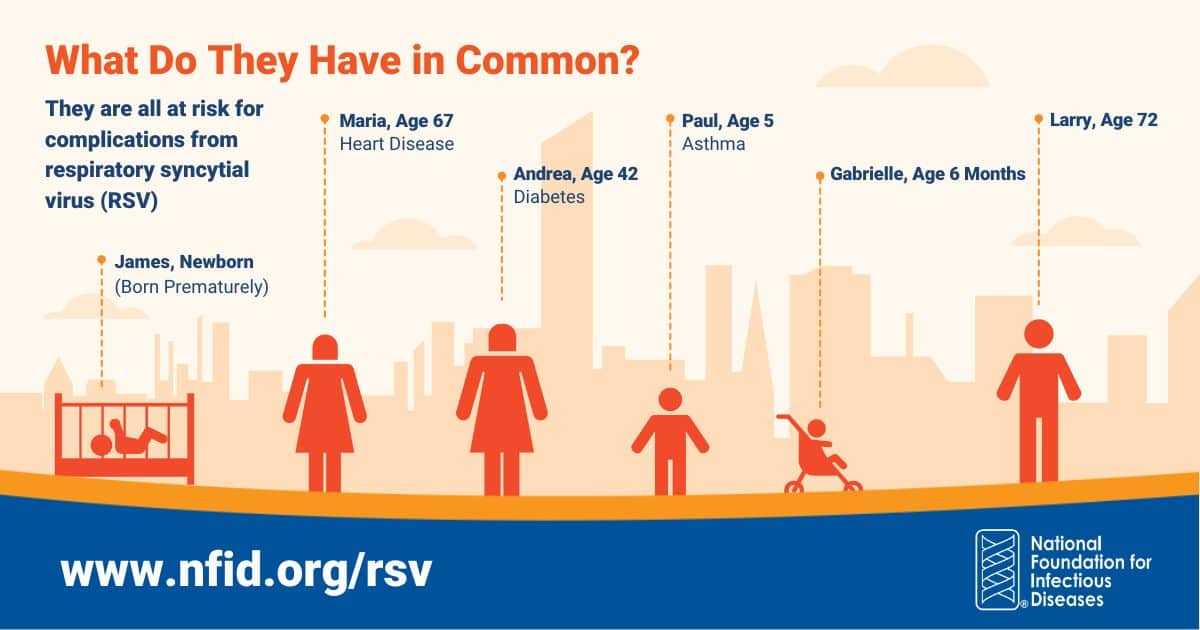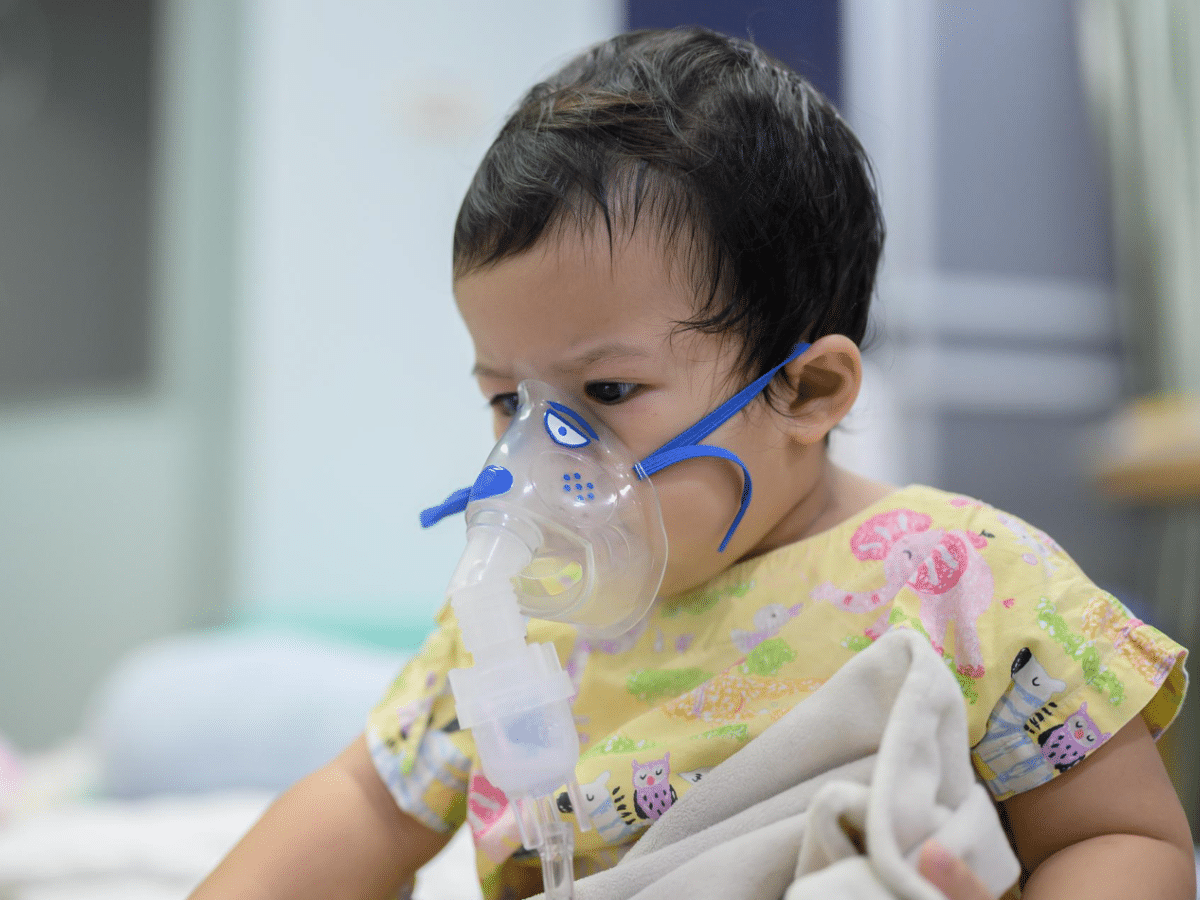What Is RSV?
When the respiratory syncytial virus infects a child, it targets the nose, throat, and lungs, causing inflammation and excessive mucus production. This infection can cause the following:
- Congestion: The virus causes swelling and mucus buildup in the nasal passages. The child will have difficulty breathing through their nose.
- Coughing and wheezing: As the virus spreads into the lower respiratory tract, it causes inflammation in the bronchi (the small airways), resulting in coughing or impaired breathing.
- Bronchiolitis: RSV is the leading cause of bronchiolitis, a condition where the bronchi become inflamed and clogged with mucus, leading to labored breathing. In severe cases, children may need oxygen or hospitalization.
- Pneumonia: RSV in infants, young children, or individuals with compromised immune systems can lead to pneumonia (a severe lung infection).
RSV can also cause dehydration, as children may struggle to drink fluids due to congestion or difficulty breathing. The respiratory distress caused by RSV can be especially dangerous for newborns, preemies, and children with underlying lung or heart conditions.
How RSV Spreads
Our pediatricians at the Children’s Medical Centers of Fresno are always ready to address some common parent questions about RSV, such as:
1. How can RSV spread through direct contact?
RSV spreads when a child or adult touches their face after coming into contact with a contaminated surface or an infected person.
2. Can RSV spread through the air?
Yes, RSV can spread through respiratory droplets. When someone with RSV coughs or sneezes, they release tiny droplets into the air, which can be inhaled by others nearby.
3. How long can RSV survive on surfaces?
RSV can survive for several hours on surfaces like tables, toys, doorknobs, and countertops, making surface contamination one of the easiest ways the virus can spread.
4. Does close contact increase the risk of spreading RSV?
Yes, especially in daycare settings where young children frequently engage in close contact, such as holding, playing together, or sharing food and drinks.
Concerned about your child’s symptoms? Schedule a telemedicine or sick visit to screen for RSV lung infection and receive tailored medical advice.
Recognizing the Early Signs of RSV
Spotting early RSV symptoms and managing them at home can help most children recover smoothly. Remember the common symptoms in children, which include coughing, wheezing or breathing problems, and fever.
More severe symptoms in infants and young children include:
Risk Factors for Severe RSV

Infants and young children still have developing immune systems and smaller airways, which puts them at higher risk for RSV. The children at the greatest risk for severe illness from RSV include Native American and Alaska Native children, children born prematurely, and children with chronic lung disease or congenital heart disease.
Other groups at risk include children struggling with swallowing or clearing mucus and those with:
RSV Infection: Disproportionately Affecting Vulnerable Groups
A study involving Tennessee residents hospitalized with RSV between 2016 and 2023 shows that hospitalization rates were significantly higher among Black and Hispanic residents.
Notably, the incidence rate of RSV hospitalizations among Hispanic people increased to 2.6 times than that of non-Hispanic individuals during 2020–2023, up from 1.3 times in 2016–2020.
To help address such disparities in RSV care, we offer convenient telemedicine services to parents and families in need, in addition to our newborn and broad pediatric services.
Treatment Options for RSV
At-home care for mild RSV focuses on relieving discomfort and managing its symptoms:
- Dehydration: Offer small amounts of water, breast milk, or formula frequently to avoid dehydration.
- Fever: Give acetaminophen or ibuprofen to children over six months, as your pediatrician recommends, to relieve fever and discomfort.
- Congestion: Before feeding or sleeping, clear your child’s nose passages using saline drops and a bulb syringe.
- Rest: Encourage plenty of rest to help the body recover from the infection.
- Humidifier: A cool-mist humidifier should help ease congestion and make breathing more comfortable by adding moisture to the air.
Stay in touch with your pediatrician if symptoms change or worsen. For customized RSV advice, call (559) 455-1500.
When Hospitalization May Be Necessary
Newborns, preemies, or those with lung or heart conditions may experience severe symptoms that require constant monitoring. In a hospital setting, the medical staff will watch for signs of breathing difficulty, lack of oxygen, and dehydration. Your child may need oxygen therapy, IV fluids, or, in some cases, mechanical ventilation to help with their breathing.
When to Consider Immunization
Immunization can reduce the likelihood of severe RSV infections and complications. Consider getting yourself immunized if you are pregnant and want to protect your newborn or if your child:
- Is at higher risk for RSV complications due to prematurity
- Has other health concerns that may worsen RSV
Protect Your Little One from RSV—Start at CMCFresno

Newborns, preemies, and toddlers are yet to develop a robust immune system, making them vulnerable to RSV infection, the symptoms of which can progress into wheezing, difficulty breathing, and dehydration.
As your child’s first layer of protection, you must learn to recognize the early symptoms, provide informed at-home care, and know when to seek medical attention. Always remember that proactive intervention allows for timely treatment and reduces the risk of complications.
Concerned about RSV symptoms? Contact (559) 455-1500 and speak with our specialists at Children’s Medical Centers of Fresno today. We offer:
- Personalized newborn and preemie care
- Consultations for RSV-related concerns
- Flexible options for in-person sick visits and telemedicine appointments
- RSV immunizations for babies and pregnant women
Don’t hesitate to reach out and schedule an appointment!
Concerned About RSV?





